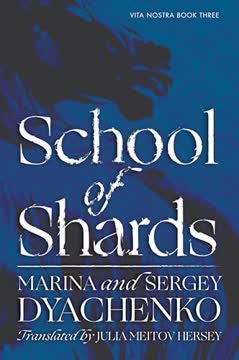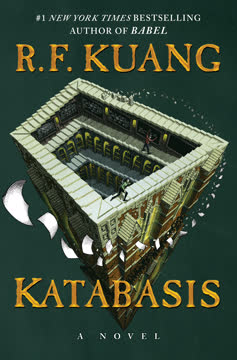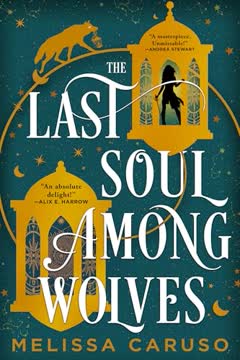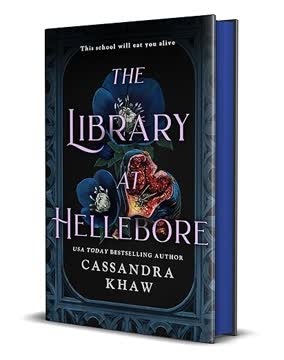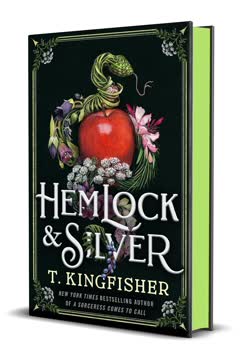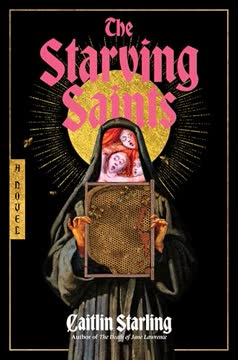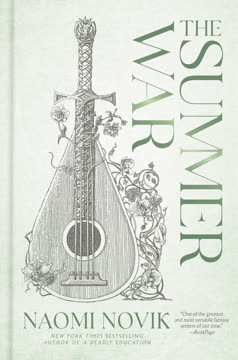Plot Summary
The Institute's Unforgiving Rules
At the Torpa Institute of Special Technologies, students are conscripted, not enrolled by choice. The price of failure is catastrophic: the death of a loved one, or a fate worse than death. The curriculum is not of this world—students are forced to perform mental exercises that push the boundaries of human cognition, transforming them into Words of the Great Speech, the fundamental building blocks of reality. Fear is the primary motivator, and the faculty, led by Sasha Samokhina, enforce a regime where obedience is absolute. The Institute's rituals, from the academic hymn to the deadly exams, set the stage for a world where reality itself is malleable, and the cost of error is existential.
Sasha's World Without Fear
Sasha, once a student, is now the architect of a new reality—one where fear has been banished. As Password, she can create and destroy worlds, but her utopia is flawed. Without fear, motivation withers, and the Great Speech—the grammar of existence—begins to decay. Sasha's reforms, intended to foster kindness and love, instead breed apathy and stagnation. She is tormented by the knowledge that her world is dying, and that her own actions may have doomed it. The faculty debates how to save the Institute, but Sasha knows the solution requires a return to balance, even if it means reintroducing the very fear she sought to erase.
The Grigoriev Twins' Summer
Pashka and Arthur Grigoriev, twin brothers on the cusp of adulthood, spend their summer in Torpa, oblivious to the Institute's true nature. Their family is lively and loving, a testament to Sasha's attempt to create a world without tragedy. Yet, both boys carry within them the glimmer of something more—a potential to become Words in the Great Speech. When a near-tragedy at the river is averted by a mysterious man in dark glasses, the twins are drawn into the Institute's orbit. Their innocence is shattered as they are manipulated, tested, and ultimately chosen for a destiny that will pit them against each other and the fabric of reality itself.
Valya's Unraveling Reality
Valya, Sasha's much younger half-brother, is a sensitive, anxious boy who feels out of place in his own life. Haunted by the disappearance of his sister and the dissolution of his family, Valya's reality begins to fracture. He experiences visions of disaster, messages only he can see, and the sudden, inexplicable absence of his parents. When Sasha reappears, she reveals the truth: Valya is to be enrolled at the Institute, his will overridden, his life rewritten. As he is drawn into the school's orbit, Valya's sense of self and reality is tested, and he becomes both a pawn and a key in Sasha's desperate attempt to save her world.
The Hamster Test
The Institute's pedagogy is brutal: students are ordered to kill a hamster at the press of a button, a test of obedience and will. Sasha, now a professor, oversees this ritual, knowing its true purpose is to strip away humanity and reveal the Word within. Some students comply without question; others resist, but all are changed. The test is a microcosm of the Institute's philosophy—only those who can balance submission with selfhood can survive. For Valya, the test becomes a crucible: he refuses, and in doing so, both fails and passes, revealing a capacity for resistance that marks him as special, but also sets him on a path of suffering.
The Price of Obedience
As the semester unfolds, the cost of obedience becomes clear. The Grigoriev twins are manipulated into acts that wound themselves and those they love—Arthur is forced to strike his grandmother, Pashka to swallow coins that symbolize his complicity. The Institute's assignments are not just academic but moral, designed to fracture relationships and instill guilt. Sasha, struggling with her own role as both creator and enforcer, watches as her students—and her brother—are broken and remade. The price of survival is the loss of innocence, the severing of familial bonds, and the internalization of the Institute's merciless logic.
The Loop and the Shard
Some students, like Alyssa, become trapped in temporal loops, forced to relive the same day until they can complete impossible exercises. The Institute's reality is unstable, with time itself bending to the needs of the curriculum. Sasha, desperate to save at least some of her charges, intervenes, but her efforts are often too little, too late. Valya, carrying a shard of Sasha's own essence, becomes both a beacon of hope and a source of danger. As he and the twins struggle to master the exercises, the boundaries between self and other, past and present, begin to blur, and the possibility of escape or redemption seems ever more remote.
The Great Speech Fails
The heart of the Institute's crisis is linguistic: the Great Speech, the grammar that underpins reality, is failing. Students are no longer becoming true Words; the structure of existence is degenerating into incoherence. Sasha and the faculty debate reforms, but every solution seems to accelerate the decline. The exercises grow more abstract and punishing, and the students' suffering intensifies. The threat is existential—not just to the Institute, but to the world itself. If new Words cannot be forged, reality will collapse into silence, and all that Sasha has built will be lost.
Syntactic Connections
The Grigoriev twins, once inseparable, are forced apart by the Institute's machinations. Their bond, both a source of strength and vulnerability, becomes the focus of a new experiment: can they, as adverb and particle, form a syntactic connection strong enough to alter the course of reality? Arthur's capacity for self-sacrifice and Pashka's rebellious will are tested to the limit. Their relationship, once defined by love and rivalry, is recast in grammatical terms, as they become instruments in Sasha's final gamble to save the Speech. The outcome will depend on their ability to trust, forgive, and act in concert.
The Exam and the Fire
The winter exam is the crucible in which the fate of the students—and the world—is decided. Failure means not just personal loss, but the destruction of everything they hold dear. As the exam unfolds, the pressure mounts: Pashka struggles with the final exercise, Arthur risks everything to help him, and Eva's fate hangs in the balance. Meanwhile, Sasha's own home is sacrificed in a literal fire, a symbolic act of atonement and desperation. The students' success or failure will determine whether the Great Speech can be renewed, or whether reality will collapse into chaos.
The Collapse of Reality
As the exam concludes, the consequences ripple outward. Valya, having glimpsed the true state of the world—a city in ruins, the Speech in tatters—suffers a breakdown that threatens to unravel what little remains. The boundaries between self and world, language and matter, are dissolving. Sasha, stripped of her last refuge, must confront the possibility that her efforts have been in vain. The students, traumatized and changed, face a future that may not exist. The Institute, once a place of transformation, now stands on the brink of annihilation.
The Final Consultation
In the aftermath, Sasha gathers the three boys—Valya, Pashka, and Arthur—for a final consultation. She reveals their true natures: adverb, particle, verb. Together, they must attempt one last, desperate act—a grammatical intervention at the heart of reality. The process is dangerous, possibly fatal, and success is far from certain. Each must play their part: Pashka to set the direction, Arthur to affirm or negate, Valya to command. Their cooperation, forged through suffering and love, becomes the last hope for the world.
Sacrifice and Verification
The boys' intervention is both a leap of faith and an act of sacrifice. Sasha, too, must give up her last anchor—her home, her illusions, her claim to love. The process of verification, the empirical confirmation of meaning, is enacted not through logic but through trust and surrender. The world is remade, not as a utopia, but as a place where fear, choice, and love coexist. The cost is high: memories are lost, relationships are altered, and the promise of happiness is uncertain. Yet, in the act of creation, meaning is restored.
The End of the Loop
With the intervention complete, the temporal loops are broken, and the students are released from their cycles of suffering. Alyssa is freed from her endless day, the twins are reconciled, and Valya is allowed to return to ordinary life. The Institute, its purpose fulfilled, begins to dissolve into memory. The world outside Torpa is restored, but changed—no longer a place without fear, but one where choice and consequence are possible. The students, marked by their experiences, must find their way in a reality that is both familiar and strange.
The Return to Ordinary Life
The Grigoriev twins are expelled from the Institute, their memories intact but their destinies altered. Eva remains behind, her love for both brothers unresolved. Valya is sent home, his powers stripped away, his future uncertain. Sasha, having paid the ultimate price, is left alone, her role as Password complete. The world goes on, but the scars of the Institute remain. The promise of a normal life is both a blessing and a burden, a reminder of what was lost and what was saved.
The Promise of Memory
In the aftermath, Sasha and Yaroslav meet one last time. He chooses to remember everything—the pain, the love, the alternate lives—refusing the comfort of forgetfulness. Sasha promises that he will never forget her, even as she fades from the world. The students, too, carry the memory of what they endured, and what they became. The Great Speech endures, not as a perfect system, but as a living, changing reality, shaped by those who dare to speak and act.
The Last Word
As the story closes, Sasha prepares to leave, her task complete. The Institute is emptying, the students are moving on, and the world is once again open to possibility. The final lesson is not one of mastery, but of humility: meaning is never fixed, reality is always in flux, and the only certainty is change. The promise of the Great Speech is not perfection, but the ongoing struggle to create, to love, and to endure. The last word is not an ending, but an invitation—to speak, to act, to live.
Characters
Sasha Samokhina
Sasha is both the architect and the victim of the world she has remade. Once a student, now the provost of the Institute, she is the Password—a being capable of shaping reality through the Great Speech. Haunted by her own power and the unintended consequences of her reforms, Sasha is driven by a desire to create a world without fear, only to discover that fear is essential to growth, choice, and meaning. Her relationships—with her brother Valya, the Grigoriev twins, and her lost love Yaroslav—are marked by guilt, longing, and sacrifice. Sasha's journey is one of self-discovery, as she learns that true creation requires both love and loss, and that the price of harmony is never cheap.
Valya Shanin
Valya is Sasha's younger half-brother, a sensitive and anxious boy thrust into the Institute's world against his will. Marked by a shard of Sasha's own essence, Valya becomes both a pawn and a key in the struggle to save reality. His journey is one of transformation—from passive victim to active agent, from object to subject. Valya's resistance to the Institute's cruelty, his capacity for love (especially for Alyssa), and his ultimate willingness to sacrifice himself make him the embodiment of the imperative: to act, to choose, to command. His development is fraught with pain, but also with the possibility of redemption.
Pashka Grigoriev
Pashka, one of the Grigoriev twins, is defined by his restless will and his refusal to submit. He is the adverb of direction, always seeking, questioning, and pushing against boundaries. His relationship with his brother Arthur is both a source of strength and a site of conflict, as the Institute's trials force them apart and then demand their cooperation. Pashka's journey is one of learning to trust—not just others, but himself. His rebellion is both his weakness and his gift, enabling him to play a crucial role in the final act of creation.
Arthur Grigoriev
Arthur, the other Grigoriev twin, is steadier, more dutiful, and more prone to self-sacrifice. As the particle, he determines the probability of success or failure, serving as both anchor and judge. His bond with Pashka is tested by the Institute's cruel assignments, but ultimately proves unbreakable. Arthur's struggle is to balance loyalty with autonomy, to support without losing himself. His capacity for affirmation and negation, for saying yes or no at the critical moment, makes him indispensable to the restoration of the Great Speech.
Alyssa Ostapova
Alyssa is a second-year student who becomes trapped in a temporal loop, unable to progress until she completes impossible exercises. Her suffering is emblematic of the Institute's brutality, but also of the possibility of grace. With Valya's help, she is freed, and their relationship becomes a rare source of tenderness in a harsh world. Alyssa's journey is one of endurance, vulnerability, and the longing to be human. Her fate is tied to Valya's, and her release from the loop is both a personal and a cosmic victory.
Eva Danilova
Eva, a first-year student with a prickly exterior and a hidden vulnerability, becomes the focus of both twins' affections. Her struggle to pass the Institute's exams mirrors the larger struggle for meaning and survival. Eva's resilience, her capacity to adapt, and her eventual success are hard-won. She represents the ordinary student caught in extraordinary circumstances, and her choices—especially regarding love—highlight the costs and ambiguities of freedom.
Konstantin Faritovich (Kostya)
Kostya, the man in dark glasses, is both a tool of the Institute and a remnant of an earlier reality. As a pronoun, he stands in for others—especially Farit, the former antagonist—and serves as the enforcer of the Institute's rules. His relationship with Sasha is complex: part ally, part adversary, part unrequited lover. Kostya's actions are often harsh, but motivated by a sense of duty and a longing for connection. He embodies the tension between function and feeling, between the needs of the Speech and the desires of the heart.
Oleg Borisovich Portnov
Portnov is the Institute's most enigmatic professor, a figure of both stability and decay. He is the guardian of the Great Speech, but also a witness to its decline. His methods are rigorous, his standards unforgiving, and his empathy limited. Yet, he is not without compassion, and his relationship with Sasha is marked by mutual respect and regret. Portnov's struggle is to maintain meaning in a world where language itself is failing, and his fate is tied to the success or failure of his students.
Adele Victorovna
Adele is a senior faculty member, elegant and exacting, who often opposes Sasha's reforms. She is a traditionalist, committed to the old ways, and skeptical of Sasha's attempts to remake the Institute. Her relationship with Sasha is adversarial but not without admiration. Adele's role is to test, to challenge, and to hold the line against chaos. Her failures and successes are both personal and institutional, reflecting the broader struggle between innovation and tradition.
Yaroslav Grigoriev
Yaroslav, the twins' father and Sasha's lost love, is more symbol than presence—a projection of courage, trust, and the possibility of harmony. His absence haunts both Sasha and the twins, shaping their destinies and their understanding of love. In the end, Yaroslav chooses memory over oblivion, refusing to forget the pain and beauty of his many lives. He represents the hope that meaning can endure, even in the face of loss.
Plot Devices
The Great Speech and Grammatical Structure
The central conceit of the novel is that reality is constructed and maintained by the Great Speech—a grammar that governs not just language, but existence itself. Students at the Institute are transformed into Words, each with a specific grammatical function (verb, adverb, particle, pronoun, etc.). The decline of the Speech mirrors the decay of meaning, motivation, and reality. Exercises, exams, and rituals are all designed to test and refine the students' capacity to embody these functions. The narrative structure itself is recursive and self-referential, with time loops, foreshadowing, and metafictional elements that blur the line between story and reality.
Temporal Loops and Causality
The use of time loops—students reliving the same day until they succeed—serves as both a metaphor for psychological stasis and a literal obstacle. The loops are a form of punishment, but also of preparation, forcing characters to confront their limitations and find new solutions. The manipulation of time is also a plot device for exploring regret, repetition, and the possibility of change. The narrative frequently folds back on itself, with events echoing, repeating, or being rewritten as characters gain new understanding.
The Hamster Test and Moral Dilemmas
The recurring motif of the hamster test—a command to kill a helpless creature—serves as a crucible for character development. It forces students to confront the limits of obedience, the meaning of choice, and the price of survival. The test is both literal and symbolic, encapsulating the Institute's philosophy: only those who can balance submission with selfhood can become true Words. The moral ambiguity of the test, and the varying responses of the characters, drive much of the psychological tension.
Syntactic Connections and Cooperation
The climax of the novel hinges on the ability of the Grigoriev twins and Valya to form a syntactic connection—a grammatical structure that allows them to act in concert and alter reality. This device literalizes the idea that meaning is created not in isolation, but through relationship, cooperation, and mutual support. The success or failure of the intervention depends on trust, forgiveness, and the willingness to act together, even at great personal cost.
Foreshadowing and Metafiction
The novel is rich in foreshadowing, with early events and motifs (the river, the fire, the hamster, the broken city) recurring in new forms. The narrative is self-aware, often commenting on its own structure, the nature of storytelling, and the limits of language. The characters' struggles are both literal and allegorical, inviting the reader to question the boundaries between fiction and reality, author and character, word and world.
Analysis
School of Shards is a profound meditation on the relationship between language, reality, and the self. By literalizing the idea that words create worlds, Dyachenko explores the consequences of trying to build a utopia—one without fear, pain, or loss—only to discover that such a world is sterile and unsustainable. The novel interrogates the nature of agency, the necessity of suffering, and the possibility of redemption. Its characters are both archetypes and individuals, their struggles both personal and cosmic. The Institute, with its brutal pedagogy and impossible demands, is a metaphor for the process of maturation, the loss of innocence, and the forging of meaning in a chaotic world. The use of grammatical roles as character functions is both playful and profound, suggesting that identity is always relational, always in flux. In the end, the novel offers no easy answers—only the hope that, through love, sacrifice, and the courage to act, we can create a reality worth inhabiting, even if it is always, inevitably, a world of shards.
Last updated:
Review Summary
School of Shards concludes the Vita Nostra trilogy, receiving mixed reviews. Many praise its mind-bending concepts, unique magic system, and satisfying ending. Readers appreciate the exploration of language, reality, and human nature. However, some find it less engaging than the first book, with weaker character development and repetitive elements. The translation quality has improved, but opinions vary on the new characters and storylines. Overall, fans of the series find it a fitting conclusion, while others suggest reading only the first book.
